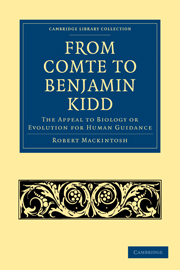Book contents
- Frontmatter
- PREFACE
- Contents
- CHAPTER I INTRODUCTORY
- PART I COMTISM, WITH SOME SCATTERED PARALLELS
- PART II SIMPLE EVOLUTIONISM—SPENCER, STEPHEN
- PART III DARWINISM, OR STRUGGLE FOR EXISTENCE
- PART IV HYPER-DARWINISM—WEISMANN, KIDD
- CHAPTER XVIII A “FAIRY TALE OF SCIENCE”?
- CHAPTER XIX HYPER-DARWINISM IN SOCIOLOGY: STRUGGLE MADE ABSOLUTE—MR. KIDD
- CHAPTER XX SUMMARY AND CONCLUSIONS
- Index
CHAPTER XVIII - A “FAIRY TALE OF SCIENCE”?
Published online by Cambridge University Press: 29 August 2010
- Frontmatter
- PREFACE
- Contents
- CHAPTER I INTRODUCTORY
- PART I COMTISM, WITH SOME SCATTERED PARALLELS
- PART II SIMPLE EVOLUTIONISM—SPENCER, STEPHEN
- PART III DARWINISM, OR STRUGGLE FOR EXISTENCE
- PART IV HYPER-DARWINISM—WEISMANN, KIDD
- CHAPTER XVIII A “FAIRY TALE OF SCIENCE”?
- CHAPTER XIX HYPER-DARWINISM IN SOCIOLOGY: STRUGGLE MADE ABSOLUTE—MR. KIDD
- CHAPTER XX SUMMARY AND CONCLUSIONS
- Index
Summary
Although we have passed under review a reaction from Darwinism, on moral grounds, or in the moral region, yet the theory which in recent years has excited most attention, both popular and scientific, is not a qualification of the Darwinian doctrine of struggle, but an intensified assertion of it. Weismann, like the young Rehoboam, meets all discontent with a stiffer front and a severer policy. “My father chastised you with whips, but I will chastise you with scorpions.” Darwin laid a terrible emphasis upon struggle for existence; but he admitted other causes of progress, such as sexual selection and use-inheritance; Weismann admits no cause of progress whatsoever, except struggle for existence; no selection of the beautiful by the instinct of sex, and above all, no inheritance of acquired qualities. Such is Weismann's position; a scientific position in regard to technical questions of biology, held by a competent and highly distinguished, though also a highly speculative man of science. But the position manifestly involves or suggests inferences regarding human progress: and these are worked out with devout fidelity, and with much ability and knowledge, by Mr. Benjamin Kidd.
Primarily, the question between Darwin and Weismann is one of fact. Does experience confirm or does it refute belief in the inheritance of acquired qualities? Unfortunately, this question like many others is more easily put than answered.
- Type
- Chapter
- Information
- From Comte to Benjamin KiddThe Appeal to Biology or Evolution for Human Guidance, pp. 215 - 237Publisher: Cambridge University PressPrint publication year: 2009First published in: 1899

